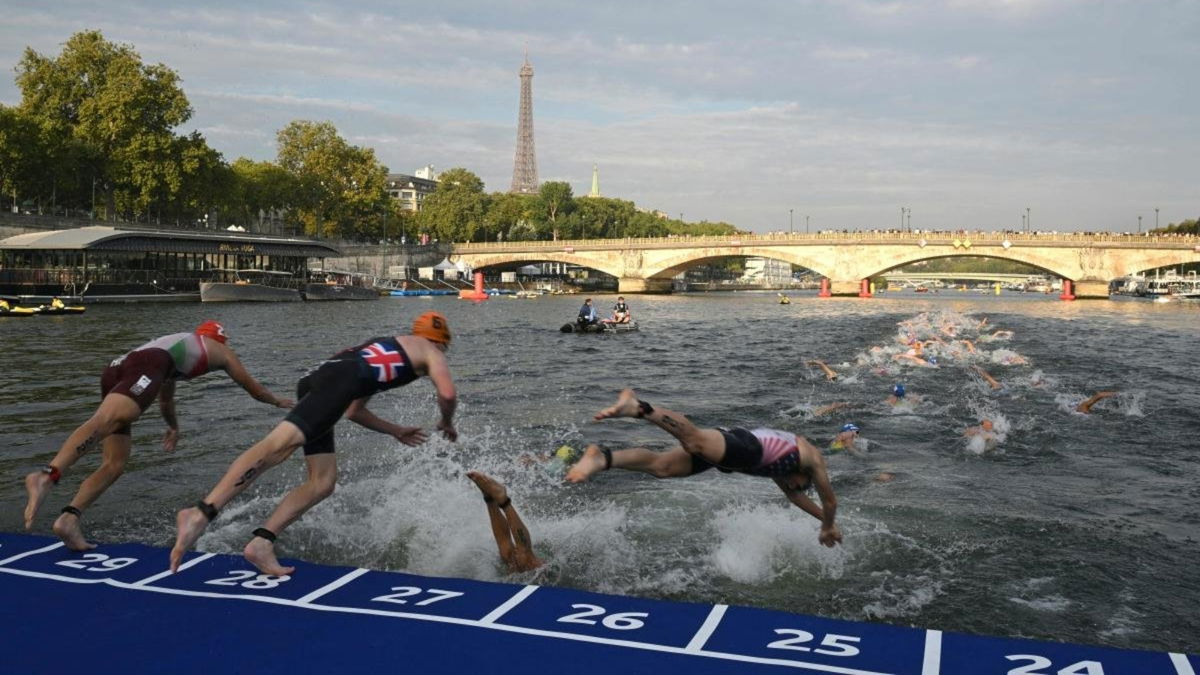

As the City of Love gets ready for the Paris Olympics 2024, the most romantic river in the world has garnered notoriety for posing significant hurdles to the swimming events. The Seine’s significance in this year’s Olympics extends far beyond its picturesque banks, as it will host 140 boats ferrying over 10,000 athletes for the grand opening ceremony and become the stage for thrilling triathlon, marathon swimming, and para-triathlon events. But the river has had a troubling past.
Watch What’s Trending Now!
Since 1923, swimmers have been prohibited from using the Seine because of elevated levels of metal and fecal bacteria, casting a shadow over competitions. However, in an ambitious endeavor, a €1.4 billion clean-up initiative has been underway, aimed at rejuvenating the iconic waterway in time for the global spotlight of the 2024 Games. Yet, despite rigorous efforts since 2020, recent developments have sparked concerns reminiscent of the alarming situations faced by the hosts of the Rio 2016 Games, signaling worry for the world’s elite swimmers.
ADVERTISEMENT
With less than 100 days until the Paris Olympics, is it safe to swim in the Seine?
A recent test conducted by the Surfrider Foundation Europe showed concerning findings about the water quality of the River Seine, particularly at the Alexandre III Bridge. The Surfrider Foundation, with over two decades of monitoring water quality in the Seine, noted high concentrations of E. coli and enterococci bacteria, both indicative of fecal matter, in their recent findings. The report’s stark assessment warned, “It is therefore clear that the athletes who will be taking part in the Olympic and Paralympic events planned for the Seine will be swimming in polluted water and taking significant risks to their health.”

Reuters
A visualisation of the 2024 Paris Olympic Games opening ceremony is pictured in this undated handout obtained December 13, 2021. Paris 2024/Florian Hulleu/Handout via REUTERS THIS IMAGE HAS BEEN SUPPLIED BY A THIRD PARTY NO RESALES. NO ARCHIVES
Despite the billions invested in the clean-up project, which includes connecting river docks and boats to the sewage system and constructing the Austerlitz Basin, organizers have encountered persistent challenges during heavy rain, leading to heightened levels of contamination. Notably, this has been a problem that could never be managed entirely.
ADVERTISEMENT
Last year in August, the World Aquatics Open Water Swimming World Cup, scheduled to take place in the Seine, was canceled because of poor water quality. The event was supposed to be a test event ahead of the Paris Olympics. After that, two more events had to be canceled in August itself for the same reason. Nevertheless, Paris 2024 Olympics president Tony Estanguet maintains confidence in hosting swim events in the Seine, asserting that contingency plans are firmly in place.
Top Stories
NFL Makes Final Punishment Decision on Shedeur Sanders Incident in Week 17

Jerry Jones Finally Acknowledges the Dak Prescott Gamble Hasn’t Paid Off; Confirms Painful Changes Ahead for Cowboys

Chiefs Coach Abruptly Leaves Andy Reid’s Staff Amid Titans’ Rumored Interest in Matt Nagy

“I’d Be Dead”: NASCAR Legend Credits Kevin Harvick for Saving His Life

Two-Time Venezuelan UFC Champion Clears Stance on Trump’s Takeover and Maduro’s Capture

Kyle Whittingham Cuts Ties With Wink Martindale & Five Michigan Coaches in Major Shake-Up

However, he acknowledged, “There is a final decision where we could not swim. It’s what we want to avoid, of course. But there’s a risk, there’s always a risk. When you are in a sport where you rely on the natural conditions, you have to adapt. “ As the spotlight turns to addressing this pressing issue, parallels can be drawn to similar challenges faced by previous hosts of the 2016 Rio Olympics.
ADVERTISEMENT
How the 2016 Rio Olympics faced similar concerns
In 2016, a study commissioned by the Associated Press highlighted alarming levels of pollution in Rio de Janeiro’s waterways ahead of the Olympic Games. The study revealed viral levels in the water to be 1.7 million times higher than what would be considered alarming in the United States and Europe.
Swimmers and athletes faced the threat of contracting viruses that could cause stomach and respiratory illnesses, as well as more severe conditions like heart and brain inflammation, with adenovirus levels reaching over 37 million per liter in some samples. Even tourists visiting popular beaches such as Ipanema and Copacabana were at risk because of the contaminated water. This led the scientists to advise, “Don’t put your head under water.” Understandably, this is difficult to adhere to in aquatic sports.
ADVERTISEMENT
Despite concerns, sailors at the 2016 Olympics displayed little fear of entering the water, with emergency measures in place should water quality deteriorate during the Games. Tania Braga, head of Sustainability and Legacy at Rio, assured that athlete safety was the top priority, with daily tests conducted during the Games. As the athletes gear up for the pinnacle stage at the Paris Olympics, would it be ready in less than 100 days? Comment below!
ADVERTISEMENT
ADVERTISEMENT
ADVERTISEMENT

